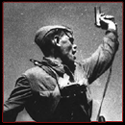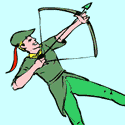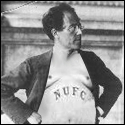|
websterandwebster posted:Oooooooh, I see. I never even thought about what key it was in. When I play guitar I just play, I don't give two shits about what key it is. I was wondering what those flats to the right of the treble clef were doing there, and I thought they must have something to do with it. That makes things kinda easier, yet 10x harder at the same time. Man, trying to reading this stuff is so slow and tiring. Does this mean i'll actually have to learn the circle of fifths now? No you just read right across from where the sharp or flat is marked. You can pencil in the sharp or flat while you are getting used to it if it helps. We need to kickstart this thread, the guitar people should not be beating us. What is everyone working on at the moment? I just started on the In Bruges theme, it is very easy to play and hauntingly beautiful. Also the James Bond theme from Dr. No kicks all sorts of rear end.
|
|
|
|

|
| # ? May 22, 2024 14:39 |
|
Can anyone identify this song? http://www.youtube.com/watch?v=0QKHQjJNyG4 The video creator said it was stock music and my software didn't recognize it.
|
|
|
|
websterandwebster posted:...and the ones it has shown are not actually right and they are just the normal note. So I don't know what i'm missing. You've got the key signature part now, but I think this part is natural signs. Natural signs look a lot like sharps, but instead of meaning, well, sharp, they mean cancel the sharp (or flat). (Like Yiggy said, sorry if you already knew this!) edit: quote:No you just read right across from where the sharp or flat is marked. You can pencil in the sharp or flat while you are getting used to it if it helps. This is technically correct, but just the other day I had a middle school player only play Bb when the note was on the middle line of the treble clef staff, and B natural when it was below the staff...so just so you know, websterandwebster, if a letter name is marked flat in the key signature, it means ALL octaves of that letter name are flat, not just the specific one on the staff. Eventually it becomes second nature to read it like this, I swear. Hawkperson fucked around with this message at 05:46 on Feb 3, 2010 |
|
|
|
OctaviusBeaver posted:We need to kickstart this thread, the guitar people should not be beating us. What is everyone working on at the moment? I've been sightreading a bunch of Chopin Mazurkas lately. I play piano for ballet classes; there are a bunch of famous and awesome mazurkas that work great for classes with little or no arranging. The occasional runs are annoying for casual play, though, especially when I have to keep the rhythm rock solid. Thanks for doing three quintuplets in a row, Frederic! Aside from that I've been working on jazzing up stuff I already kinda know in preparation for doing serious jazz work. As someone from a mostly classical and especially baroque background, this has been difficult. Got some nice transcriptions of Astor Piazzola tangos, so mostly those have been getting the jazz treatment lately. Oh yeah if anyone has any questions about havin a job playin piano for ballet classes I'm happy to field em.
|
|
|
|
OctaviusBeaver posted:What is everyone working on at the moment? Well I'm about 3/4 through Chopin's Nocturne in C# minor thanks to this thread. Really nice to play. I'll try posting a recording when I've learnt it. After that I'll continue working through this piece (can play up to about 3min so far) which will take a long time. But it's one of my favourite Beethoven movements so It'll be worth it  EDIT: Got the wrong Beethoven sonata! KingOfTheTramps fucked around with this message at 23:15 on Feb 3, 2010 |
|
|
|
Okay, I'm an almost complete beginner at the piano (I learned a little when I was, what, 10?)... I've played the violin for 3 years and started playing the trombone a year ago. My mom is a pianist, so I should be able to go to her for lessons (she also has a steinway  ). I've always wanted to learn, but it just seemed so daunting, with two hands moving separately, etc. Do you guys think that having played the violin and trombone for even a little might help? I'm not looking to go into it professionally (too late for that), but I'd like to play as a hobby. ). I've always wanted to learn, but it just seemed so daunting, with two hands moving separately, etc. Do you guys think that having played the violin and trombone for even a little might help? I'm not looking to go into it professionally (too late for that), but I'd like to play as a hobby.
|
|
|
|
Any musical background will help obviously. Mostly just for knowing the notes and how it all works. You won't have any technical advantage though, although your fingers might be nimble/strong from violin playing.
|
|
|
|
Archer2338 posted:Do you guys think that having played the violin and trombone for even a little might help? I'm not looking to go into it professionally (too late for that), but I'd like to play as a hobby. As long as you were practicing seriously (and I don't mean like, 5 hours a day, but serious in terms of thinking and learning while practicing and not just running through exercises mindlessly) on those instruments then I think it definitely helps. I've had a huge leg up in my own learning because of my previous experience playing trombone and other instruments. Its made the piano much easier to get into. I already knew how to read music fairly well from then so I had a base of theory to start scaffolding off of. Also, experience playing other instruments is experience hearing notes and pitches. And the sooner you have those burned into your brain to the point of recognition the better off you'll be. In my unqualified opinion, with some decent solfege skills and knowledge of music reading and theory, which you can learn on any instrument, the biggest hurdle thats left is technique and skill with the hands.
|
|
|
|
OctaviusBeaver posted:I just started on the In Bruges theme, it is very easy to play and hauntingly beautiful. Thanks for this. It really is quite beautiful and apt as a beginner's piece.
|
|
|
|
I couldn't imagine learning my theoretical base on anything other than a piano. I've been playing classical guitar since I was eight years of age and my piano skills picked up at about thirteen onwards still totally override anything else in terms of sightreading and knowledge of notes.
|
|
|
|
Archer2338 posted:Do you guys think that having played the violin and trombone for even a little might help? One area I think it'd help the most is developing your melodies. I didn't really understand how to get a singing melody (or even that I could or what it was) until I started listening to violin concertos I was used to as keyboard concertos. Also I started singing around that time. Bach's preface to his two part inventions stresses that they should help players develop a cantabile, or song-like, quality in their music, so hopefully that'll help.
|
|
|
|
KingOfTheTramps posted:Well I'm about 3/4 through Chopin's Nocturne in C# minor thanks to this thread. Really nice to play. I'll try posting a recording when I've learnt it.
|
|
|
|
Does anyone have a website or a PDF of counting time signatures? I need something with each time signature, a range of different notes, and how to count them (what I I say out loud, "one and two?). Edit: It seems my problem is counting sixteenth notes, or eight notes in 2/2 time. So in 2/2 time: Half note: "One and" Quarter note: "one" or "and" Half dot: "One and two" Eighth note: How do I count these? Eli Cash fucked around with this message at 03:14 on Feb 5, 2010 |
|
|
|
OctaviusBeaver posted:
Work has made serious practice difficult, but my love affair with the French Impressionists has diminished for the moment and I've moved on to the Russian Romantics. I'm currently working on: Scriabine's 3rd Sonata in F sharp minor (Op. 23) -- Like most Scriabine, the largest difficulty comes in the enormous octave jumps in the left hand and the expression of the middle voicing in the right. This is Horowitz's recording: http://www.youtube.com/watch?v=TKX1Fk6W2wQ Bortkiewicz's Quatre Morceaux, Op. 3 - Capriccio -- I actually stumbled upon this when I was helping out my on again off again teacher hunt down hard copies of some rather difficult sheet music to find. Bortkiewicz is typically known for his set of Lamentations and Consolations and a couple of his Transcendental Etudes, but this piece is really quite nice, and I would suggest it to anyone who's looking to seriously break into the Russian Romantics. It has simpler versions of many of the techniques important for tackling Liadov, Glazunov, Scriabine, Rachmaninov, etc. It does come off as incredibly virtuosic, but is actually significantly easier than it sounds. It has both the sweeping octave melodies that you'll find in Scriabine, but also moves into lyrical portions that plays very similar to Rachmaninov (specifically his prelude #5 in G minor. I enjoy this video simply to watch the pianist: http://www.youtube.com/watch?v=9idfQVkqKyw) . It also has an absolutely stunning ending: http://www.youtube.com/watch?v=t8lnrNpibMw Blumenfeld's fantaisie etude in F minor -- This is an interesting piece. It bears some resemblance to Chopin's fantaisie impromptu, and challenges some of the same skills. The real challenge comes in bringing out the right notes in the repeating 32nd lines without losing any velocity. It also contains 4 versus 3, large jumps, and all of the other things you'd expect to find in a virtuosic etude. Similar to the Capriccio, it has a wonderful ending: http://www.youtube.com/watch?v=zZTm_ZnMM7g&feature=PlayList&p=0724963D20A7CDFC&playnext=1&playnext_from=PL&index=23 Most of the Shostikovich Preludes and Fugues -- Neo-baroque stuff. My personal favorite is #4 in E minor. The fugue is also incredibly challenging. -- http://www.youtube.com/watch?v=KStjdclOpzI On deck: I need to start seriously working through the Art of Fugue. I learned Debussy's suite Bergamasque some time ago and should probably move onto some of his more challenging music. Vine's Sonata #1 oilcheck my ass fucked around with this message at 21:35 on Feb 4, 2010 |
|
|
|
Eli Cash posted:Does anyone have a website or a PDF of counting time signatures? I need something with each time signature, a range of different notes, and how to count them (what I I say out loud, "one and two?). Wikipedia has a pretty decent one. As far as counting, I'd say it's mostly just one and two and for any duple meters, or one and a two and a for triple meters.
|
|
|
|
Yiggy posted:
I'm not sure how to go about this without becoming confrontational, but I would urge anyone who's moving to piano from a different instrument to effectively scrap EVERYTHING you know from that other instrument other than notes on the page. This is like me asking: "Oh, hay, I know the fingerings to play notes on a saxaphone, will it help me on the Oboe?" The strict answer is "I guess," but there's so much that's different about the two that there is effectively no comparison. Part of the enormous difficulty about Piano (and it's why we all study so much Bach) is trying to get our hands and minds to effectively be in two, three, or four places at the same time. Instruments that play a single note have a very linear way of thinking associated with them, while something like the piano has both a linear (as in, how does this sound all put together?) and vertical way of thinking. If you want to play piano and you have studied something else: be grateful you can read music. After you're done being grateful, assume you know absolutely nothing and that the learning process will be just as painful. This is exactly the same advice you should be getting if you wanted to seriously attack any other instrument. I've always told people the following: playing piano at a level where you're satisfied with what's coming out of the piano takes 3 hours a day for 10 years. You will spend most of those days swearing and being frustrated.
|
|
|
|
Eli Cash posted:Does anyone have a website or a PDF of counting time signatures? I need something with each time signature, a range of different notes, and how to count them (what I say out loud, "one and two?). In class, we use different methods of practicing these: * The "pam" method: Simply say "pam" on each note, making it longer or shorter as needed. A quarter note is simply "pam", a half note would be more like "pa-am", and three quarters "pa-aa-am". Two eight's would then be a quicker "pam-pam", and four sixteenths would be a rapid-fire "pam-pam-pam-pam". And then you have to combine those off course. For rests between notes, you can either make no noise, or silently hum them. I try not to make noises, counting the rests in my head, but sometimes it's way easier to actually make a sound in a break between notes. You can always take them back out afterwards when you know the rhytm better. * Clapping, or hitting the desk with a pen, or whatever. Same thing really, except that you can't hear the difference between some note with a rest, a longer note with no rest, or an ever shorter note with a longer rest. If you have a piano or something else where you can practice, you could use that. (Don't forget to practice with both hands.) * Something called the "Kodaly" time names. Instead of making a single noise for each note, everything is different. Look up "kodaly time names" or "rhytm syllables" or "french time names". May look complicated, but it's really very useful. Our teacher said that she always starts with the Kodaly method for little children, and with just "pam" for adults. But she teaches us the Kodaly names anyway, because sometimes it's just easier, especially with complicated time signatures.
|
|
|
|
I always count out the whole measure using the unit of the smallest note in the measure. Well not always. But when I'm confused about something. So lots.
|
|
|
|
There are some pieces with tricky rhythms that are hard to learn starting out. Part of this is that in general it's best to practice a new piece hands separately, especially when you're just starting out on piano. However, this can actually make learning the rhythm harder; if you're doing off-beat stuff in the right hand but the left is on the beat, it'll be harder to keep the beat with just the right. This is where a metronome can come in handy, or you can even try working on both hands together, but simplifying one of them. Instead of doing chords or a baseline with the left, just play one note per measure, on every beat. Helped me a lot on certain pieces.
|
|
|
|
I've been looking to get better at playing melody/scales, as I'm mostly playing chords, so I've heard it's a good idea to get a book of etudes, since scales are so amazingly boring to practice. However, I don't know where to start. I'm able to play Coin Song from the Final Fantasy VI piano collection (http://www.youtube.com/watch?v=4YQiBQ0bqCU) and the first part of Fisherman's Horizon from the Final Fantasy VII Piano collection (http://www.youtube.com/watch?v=41iEFursp30 up to about 1:22), to give you an idea of my level. I haven't heard much classical music, but I like Debussy, and am fond of those kinds of "jazzy" chords that one hears in the romantic period. Any suggestions?
|
|
|
|
I am currently working on Akihiko Matsumoto's Resident Evil: Outbreak main theme. It's truly one of the most beautiful pieces I've ever heard, and easily the best composition from the entire RE series. This song also has a lot of interesting chord progressions, and is giving me news ideas to utilize with other songs.
|
|
|
|
Working on scales. Scales scales scales. 123, 1234, 123, 12345. Lovin it. __________________________________54321, 321, 4321, 321.
|
|
|
|
Anyone have any suggestions on how to become more fluent at reading music? I just started to learn and thus far I can't play without having the letter written down, but I want to just be able to read it from sheet music and play.
|
|
|
|
The French Army! posted:Anyone have any suggestions on how to become more fluent at reading music? I just started to learn and thus far I can't play without having the letter written down, but I want to just be able to read it from sheet music and play. I think the only way to really get good at reading music is to do it a lot. There's no trick to it, it's just like learning to read english (possibly easier). You might make up a set of flash cards with different notes and write the note name on the back.
|
|
|
|
Anyone have any experience with a Casio CDP-100 keyboard? Would it be a good first piano for a beginner?
|
|
|
|
Bigass Moth posted:Anyone have any experience with a Casio CDP-100 keyboard? Would it be a good first piano for a beginner? I use that very piano, in fact  The keys have a nice weight to them, and you can mix and match any two out of the 5 instrument voices it has. And the 'Function' button lets you move the tones several keys up or down the piano, which is nice. The pedal is a little chintzy, but it does it's job well enough. It's also USB compatible, so you can use it with fruityloops and record your stuff. It's been sufficient enough for everything I've needed it for so far. Although, I personally would like to upgrade to something more teched out and advanced at some point in the near future.
|
|
|
|
Are there any tips or cheats for transposing songs? I want to start singing with some of the songs I'm playing but a few of them seem too high for my voice. Currently I'm working on Lionel Richie's 'Hello' (yes I watched Glee) and I just can't get that high without straining. Any help is appreciated.
|
|
|
|
Hughmoris posted:Are there any tips or cheats for transposing songs? I want to start singing with some of the songs I'm playing but a few of them seem too high for my voice. Currently I'm working on Lionel Richie's 'Hello' (yes I watched Glee) and I just can't get that high without straining. Any help is appreciated. Thinking about the chords and notes you're playing as relative intervals instead of objective names definitely helps. If I'm playing a C / G / Am / F for instance, I think about it like I / V / vi / IV, which makes it a lot easier to transpose on the fly. Do you want to transpose the sheet music by hand? If not, I'm sure you can find a MIDI of 'Hello' online somewhere, and just drag all the notes down a few steps as well, that might be faster. A lot of programs let you view MIDI as a sheet music score afterward as well.
|
|
|
|
DukAmok posted:Thinking about the chords and notes you're playing as relative intervals instead of objective names definitely helps. If I'm playing a C / G / Am / F for instance, I think about it like I / V / vi / IV, which makes it a lot easier to transpose on the fly. Do you want to transpose the sheet music by hand? If not, I'm sure you can find a MIDI of 'Hello' online somewhere, and just drag all the notes down a few steps as well, that might be faster. A lot of programs let you view MIDI as a sheet music score afterward as well. I'm not sure if I understand the theory behind transposing. The sheet music I've found for 'Hello' has it in the key of C. If I want to move it down to a range that I can sing, would I just convert it so that its in the key of G?
|
|
|
|
Hughmoris posted:I'm not sure if I understand the theory behind transposing. The sheet music I've found for 'Hello' has it in the key of C. If I want to move it down to a range that I can sing, would I just convert it so that its in the key of G? Yup. Every pitch gets moved down the same number of half steps. It can get a little confusing when you have accidentals but you should be able to sound out those parts.
|
|
|
|
Hughmoris posted:I'm not sure if I understand the theory behind transposing. The sheet music I've found for 'Hello' has it in the key of C. If I want to move it down to a range that I can sing, would I just convert it so that its in the key of G? Sure. So you'd change the key signature, and then take all the C chords and turn them into G chords, take all the F chords and turn them into C chords, take all the G chords and turn them into D chords, etc. Move all the notes 5 half steps down to find their new equivalents, their relative pitches will all stay the same if you move them by the same amount.
|
|
|
|
Could anyone post some of their favorite legato runs and techniques? I know Chopin has some very smooth ones, but I'm looking to branch out, and I want to step outside of what I already know. (I'm actually looking to incorporate these more with guitar. But I want to get away from the overused Vai/Petrucci style legato and get more into classical, more complex legato.)
|
|
|
|
Go look up some liszt.
|
|
|
|
quote:I've always told people the following: playing piano at a level where you're satisfied with what's coming out of the piano takes 3 hours a day for 10 years. You will spend most of those days swearing and being frustrated. Oh come now, this sounds like the bitter ranting of a washed up concert pianist. Playing the piano is primarily fun and I say this as someone who's put in multiple hours a day (in high school during the summer my practice hours could balloon to nearly eight hours a day) of slow practice with metronomes and counting 12 beats to bar to get a solid rendition of the Fantasie Impromptu. I mean, sure you need patience, but whenever I'm frustrated with the piano I know that no good practice will come from that session (which is why I tend to switch to improv stuff or another instrument during such times if I still feel musically inclined). I know that everyone likes to pretend that they're some ever-toiling Sissyphus but get real, if you're not enjoying yourself you're not creating good music. Business Octopus fucked around with this message at 20:12 on Apr 15, 2010 |
|
|
|
Are there any other double-jointed / mongo-fingered pianists out there? My little fingers can bend either way at the final joint about 90 degrees either way, which is fun for freaking people out at parties but when I try to play anything louder than forte with my little fingers they sometimes collapse like I'm wearing gloves that are a few sizes too big. I just bought a DVD about piano technique and the guy talks about utilising skeletal strength and stable arcs etc., which sucks because without "locking" little finger joints that's a little bit hard to do.  Does anyone else have a similar issue, or should I just give up the piano and go and join the nearest circus? 
|
|
|
|
RobattoJesus posted:Are there any other double-jointed / mongo-fingered pianists out there? My little fingers can bend either way at the final joint about 90 degrees either way, which is fun for freaking people out at parties but when I try to play anything louder than forte with my little fingers they sometimes collapse like I'm wearing gloves that are a few sizes too big. Apparently my fingers are all double jointed, it does not make an issue for me. I have exceptional finger strength and agility overall.
|
|
|
|
Herr Napalm posted:I'm not sure how to go about this without becoming confrontational, but I would urge anyone who's moving to piano from a different instrument to effectively scrap EVERYTHING you know from that other instrument other than notes on the page. This is like me asking: "Oh, hay, I know the fingerings to play notes on a saxaphone, will it help me on the Oboe?" The strict answer is "I guess," but there's so much that's different about the two that there is effectively no comparison. I agree with everything you've said except for your love hate relationship with practicing. Carl Czerny posted:Practice is the great Magician, who not only makes apparent impossibilities performable, but even easy.
|
|
|
|
gently caress quote!=edit
|
|
|
|
Anyways finished my jury for this school year and my repetoire for this semester. Nocturne in c minor Op. 48 #1 Chopin Sonata in c minor 1st movement Mozart Other various pieces I don't care for Summer repetoire: Etude in c minor Chopin or Ballade no.2 Chopin and Tempest Sonata 3rd movement beethoven  If anyone has some awesome suggestions for a rachmaninoff piece to learn other then the g minor and c# minor famous ones, let me know.
|
|
|
|

|
| # ? May 22, 2024 14:39 |
|
I've picked up Clair de Lune despite the cliche because I wanted an easier Debussy after learning Jardins Sous La Pluie and I'm re-examining Pagodes. Summer repertoire is going to be the Ondine (I'm expecting a lot of patience as I've tried and failed before, but it's just so beautiful) and some Chopin stuff because I have been waaay too into French Impressionism lately. It's nice when you go back to Romanticism to have the pieces intuitively make sense rather than needing a delicate and precise touch and feel before they sound musical.
|
|
|




















